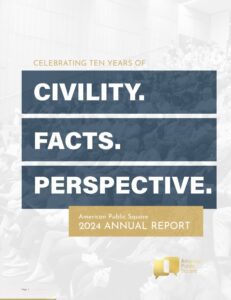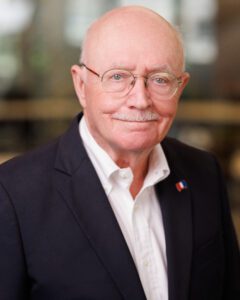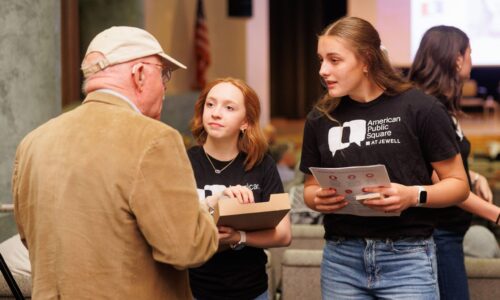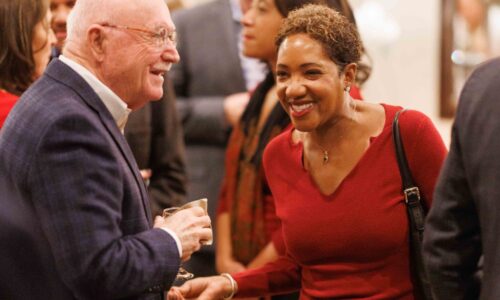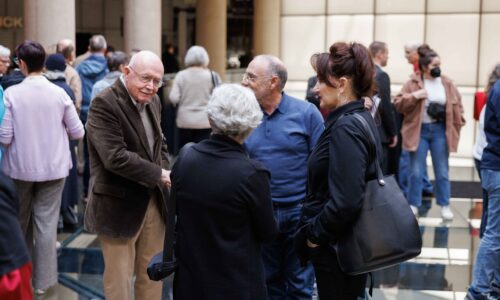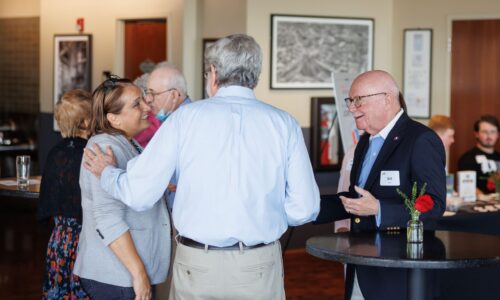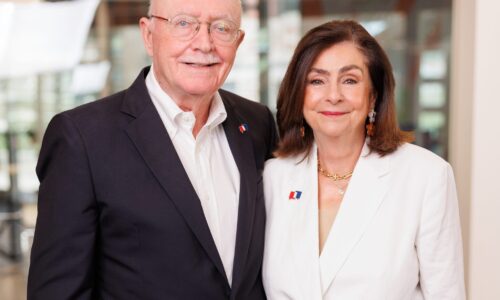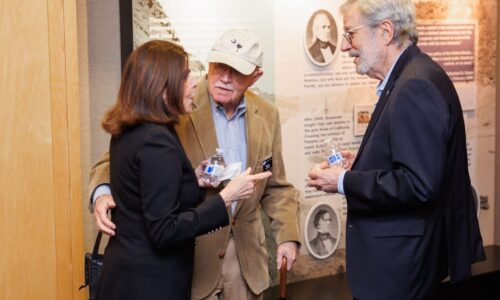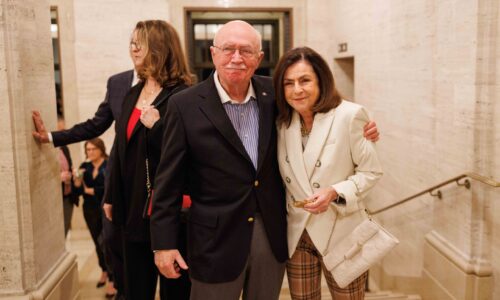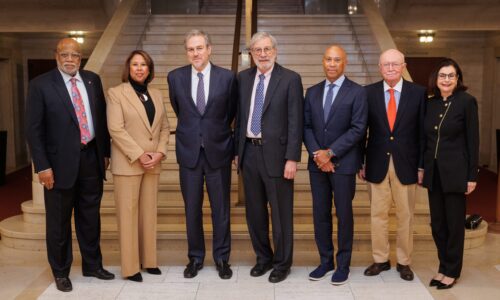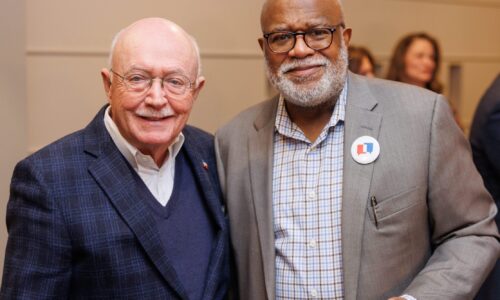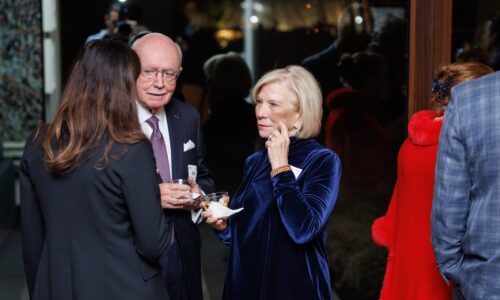News and
Updates
American Public Square Releases Its 2024 Annual Report
April 17, 2025
Kansas City, MO: American Public Square (APS) has released its 2024 Annual Report. The 2024 Annual Report highlights the organization’s tenth year of programming – a year full of reflection and reinvention. Join us on a look back at the organization’s efforts to create new ways for the community to connect and engage with each other, adding to our programming line-up film screenings, author events, presidential debate watch parties and more!
While 2024 was marked by another high-profile presidential election and related political polarization, it was also a year where communities nationwide demonstrated remarkable creativity, resilience, and unity—proving that progress is possible even when things seem to be changing by the minute.
- The year began with a leadership transition as APS Founder and CEO, Amb. Allan Katz (ret.) passed day-to-day management of APS to Claire Bishop, APS Executive Director.
- The organization announced a new national steering committee to support the organization’s growth and programming strategies.
- APS and William Jewell College announced a change to their relationship, setting the stage for APS to broaden its reach into several regional academic institutions.
- The organization continued to tackle important community issues, including the gun violence, freedom of the press, women’s health, the state of policing and more.
- To close a dynamic year, APS hosted its most successful Evening at the Square event ever, hosting NY Times columnist, Bret Stephens, in conversation with former Massachusetts Governor, Deval Patrick.
Of the 2024 Annual Report, Executive Director Claire Bishop noted, “I am always humbled by this process, awed by what we have achieved, gratified by the feedback and engagement we have received, and motivated by the fact that the need for community-building through dialogue, connection and civic engagement continues to grow.”
We invite you to view the report here.
Media inquiries can be directed to Robin Smith via email at robin@americanpublicsquare.org.
Expanding Our Mission. Broadening Our Impact.
April 17, 2025
A Statement from Claire Bishop, Executive Director of American Public Square
Recently, American Public Square’s Board of Directors and staff spent time reflecting on our decade of work in Kansas City and building a strategic plan that will guide the next decade for our organization.
Many events of great significance have taken place over the ten years APS has been in operation. From the explosion of the digital age of media, to divisive national and local elections, to the Covid pandemic and the epidemic of loneliness that resulted, we are a society living through vast and dramatic changes to our way of life.
As these changes have rocked and roiled our community, APS has been proud to show up as a programming organization that offers a glimpse of and a space for productive dialogue on topics about which individuals strongly disagree.
We recognize that in order to show up in the ways our community needs us, we must expand our mission to reflect the organization we are today. APS’ new mission: to build stronger, more connected communities through civil discourse, engagement and education, speaks to our transition from being solely an organization that offers community programs, to being a community organization that champions the ideals of a civil society.
What are those ideals, you might ask? The ideals of a civil society facilitate the open, voluntary participation of citizens and residents, enable stakeholders to hold those in power accountable to decisions that impact them, and provide a context for mutual benefit and exchange. A healthy civil society necessarily requires not only the preservation and protection of rights, but the informed participation that is understood to be a responsibility of the individuals within it.
As we rise to face the challenges of our day—the erosion of and outright threats to these ideals—APS is proud to offer community members multiple ways to take individual action that is meaningful to them.
- We will continue to offer free and accessible programming to the community where individuals with opposing issues on challenging topics meet to discuss their perspectives openly, without contempt.
- We will offer increased opportunities for community members to gather, to engage in a physical space with one another, to share ideas in such a way that the bonds of community are strengthened and supported.
- And we will expand our work in civics education and skill building, to help equip community members with resources and skills to take meaningful action in their own communities.
For these ideals to truly take root and grow in this new world, we need to embrace the opportunity to rebuild the bonds of connection, affection and respect in our communities. Our evolved mission reflects the growing body of work our organization is engaged in, and the intended outcome of this work—stronger, more connected communities that can withstand the great tides of change together.
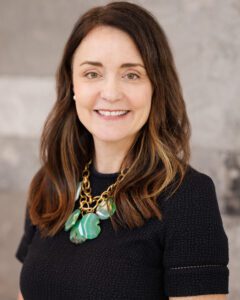
In Memoriam: Bill Kort
March 7, 2025
American Public Square mourns the loss of APS Board Member and dear friend, Bill Kort
With deep sadness, American Public Square shares the news that Board Member and longtime friend, Bill Kort, passed away on February 27, 2025.
Bill was among the first champions of American Public Square. Shortly after his return to Kansas City, APS Founder and Board Chair, Amb. Allan Katz (ret.), met Bill at a dinner event and shared his idea for the organization that would ultimately become American Public Square. Bill immediately and enthusiastically offered his support. He’s been a vital part of the organization ever since.
From helping jumpstart the organization to serving as the Board Treasurer and on to his role of co-chair for APS’ most successful Evening at the Square fundraiser just a few months ago, Bill was actively engaged for the entirety of the APS’ existence. Not only did Bill play important leadership roles for the organization, he was among the most consistent attendees at APS programs, seen frequently in the audience with his wife, Regina.
“It is difficult to express how important Bill was to me and American Public Square. He was a good friend…at lunch, on the golf course, or anytime he was helping me figure out how to grow APS. I miss him already….we will not see his like again,” Amb. Katz reflected.
Bill was thoughtful, encouraging and relentlessly supportive of APS’ mission. Allan, Nancy, Bill’s fellow Board Members and the APS staff will miss him immensely.
Please join us in remembering and honoring our dear friend. Messages to the Kort family may be left here.
Past Messages
APS Announces Changes to its Academic Home Structure
January 15, 2025
American Public Square and William Jewell College agree to an altered partnership
Since 2019, William Jewell College has served as the academic home of American Public Square. Together, they have supported on-campus programming, applied learning opportunities and internships for students, as well as a shared commitment to critical thinking and lifelong learning.
In late 2024, American Public Square and William Jewell College agreed to alter the nature of their partnership. American Public Square will no longer operate within a singular academic home structure. Rather, the organization intends to broaden relationships with multiple post-secondary institutions in our region. This shift will support American Public Square’s strategic goals centered on engaging more young professionals in APS’ mission and growing our civics education programming.
“William Jewell has been a valued partner of APS’ for many years and we look forward to continuing to work with them in a variety of ways, including joint programming and internships. We are grateful for the time the college served as our academic home and our experience with Jewell will no doubt guide us as we grow APS’ relationships with more local colleges and universities,” noted Claire Bishop, executive director of American Public Square.
With over ten years of programming experience, American Public Square’s mission centers on bringing people together to build stronger, more connected communities. APS works to champion the ideals of a civil society—where citizens engage respectfully, collaborate on shared challenges, and pursue their aspirations with purpose.
One of the ways the organization does this is through civics education efforts that empower both youth and adults with the skills to navigate today’s fast-changing information landscape so they can be active, informed citizens engaged in the important work of democracy. The APS team looks forward to the opportunity to expand these efforts.
To learn more about or support the work of the American Public Square Civics Education Initiative, reach out to APS Program Director, Tricia Maxfield, or visit americanpublicsquare.org/student.
"We are grateful for the time the college served as our academic home and our experience with Jewell will no doubt guide us as we grow APS' relationships with more local colleges and universities."
APS-Supported 2024 KC Voter Guide Now Available!
July 16, 2024

The KC Media Collective, which includes American Public Square, and The Kansas City Star announce the launch of a groundbreaking, regional initiative designed to provide widespread coverage of the 2024 election cycle – The 2024 KC Voter Guide.
This unprecedented collaboration brings together major local media organizations to ensure residents have access to information about candidates and issues from local to state and federal levels–nearly every race voters in the region will see on their ballot– just in time for the August primaries.
Information for more than 100 races compiled by 40 journalists from seven local media outlets is available on kcvoterguide.org.
The 2024 KC Voter Guide will provide wide-reaching coverage of candidates and issues on both sides of the state line heading into the August primaries. After results are confirmed, a printed version will be produced–in addition to the online version–to support voters as they prepare to head to the polls in November. The guide will be available in both English and Spanish and will be widely distributed throughout the Kansas City region via community organizations, events, and venues, ensuring the broadest possible reach.
Visitors to kcvoterguide.org will also find essential voter resources such as registration deadlines, voter tips and more.
This initiative marks the first collaboration between the Kansas City Media Collective (American Public Square, Kansas City PBS/Flatland, KCUR, Missouri Business Alert, Startland News, The Beacon) and The Kansas City Star. It is focused on supporting local voters with accessible and accurate local journalism to stay informed in a critical election year. Additional partners in this project include RevEd.
A Mid-Year Message from APS Executive Director, Claire Bishop
June 13, 2024
When we looked ahead to 2024, we knew it would be a big year for American Public Square. Not only does 2024 represent our tenth year of programming, but we also have another high-profile presidential election approaching.
We fully recognize the many diverse perspectives about the presidential election—they swing to both ends of the political spectrum. Regardless of which candidate you prefer, we know many in our communities are feeling anxious about the state of politics and the future of our nation, and that is a reality we took seriously when planning this year’s events.
Not only does APS exist to expose community members to diverse and divergent perspectives, much of what we do is also rooted in the fundamentals of community building—creating space and time for individuals within our community to rebuild our personal bonds with one another.
As we hit the halfway point of 2024, I want to highlight our increased focus on events that promote and support community building. To date, we’ve:
-
- Kicked the year off by breaking bread and diving into complex conversations together at our January event, “Let’s Talk Politics.”
- Jumped into the Spring stadium tax debate, working hard to help mitigate the tensions in our community driven by this highly contentious topic
- Proudly and humbly supported high school students from seven area schools as they tackle the complicated and timely topic of firearm violence in KC.
As we face the second half of the year, we are pleased to continue to offer the Signature events you have come to expect from us. Yet given the current political climate and the uncertainty of what lies ahead, we are also aware of our community’s need to connect with each other, without the structure of a formal program.
With this in mind, APS will offer more film screenings, book events, Member socials, student and educator workshops and more in the second half of this year. We know our Members and supporters crave the opportunity to authentically connect with others, and it is our privilege to help you fill your calendar with events that enable you to help build the bonds of community, one conversation, one exchange at a time.

P.S. We were particularly inspired by a recent report, “Searching for a New Paradigm: Collective Settings” published by More in Common and the SNF Agora Institute at Johns Hopkins University. We’ve linked it here if you’re interested in seeing the full report, but one of the key findings can be summarized in this statement, “Critically, we find that to build a more robust and vibrant democracy, Americans need more experiences where they engage directly with others to address public problems.”
American Public Square at Jewell Announces Creation of a National Steering Committee
May 23, 2024
Kansas City, MO: American Public Square at Jewell (APS) announces a new National Steering Committee, established to support the organization’s growth and programming strategies. Led by Board Chair and APS Founder, Allan Katz, members of the national steering committee will provide strategic support to the organization as it seeks to expand its impact through diverse programming formats, topics, panelists and more.
Participants of the steering committee bring a wide array of experiences and expertise, particularly in the national political landscape. They will serve in an advisory capacity to the organization’s Board of Directors, Executive Director and staff. Inaugural members of the National Steering Committee include:
- Sally Bradshaw, business owner and longtime conservative political advisor
- Jason Kander, President of National Expansion at Veterans Community Project, podcaster, author, activist, Afghanistan Veteran
- Kevin Madden, senior partner – Penta; former senior advisor – Romney for President
- Colleen Nelson, executive editor of The Sacramento Bee and McClatchy Regional Editor for California
- Terry Nelson, founder and managing partner – FP1 Strategies; campaign and media strategy expert
- Deval Patrick, author, businessman, attorney and former governor of Massachusetts
- Margaret Talev, Kramer Director – Syracuse University Institute for Democracy, Journalism and Citizenship
Media inquiries can be directed to Robin Smith via email at robin@americanpublicsquare.org.
American Public Square at Jewell Releases Its 2023 Annual Report
June 27, 2023
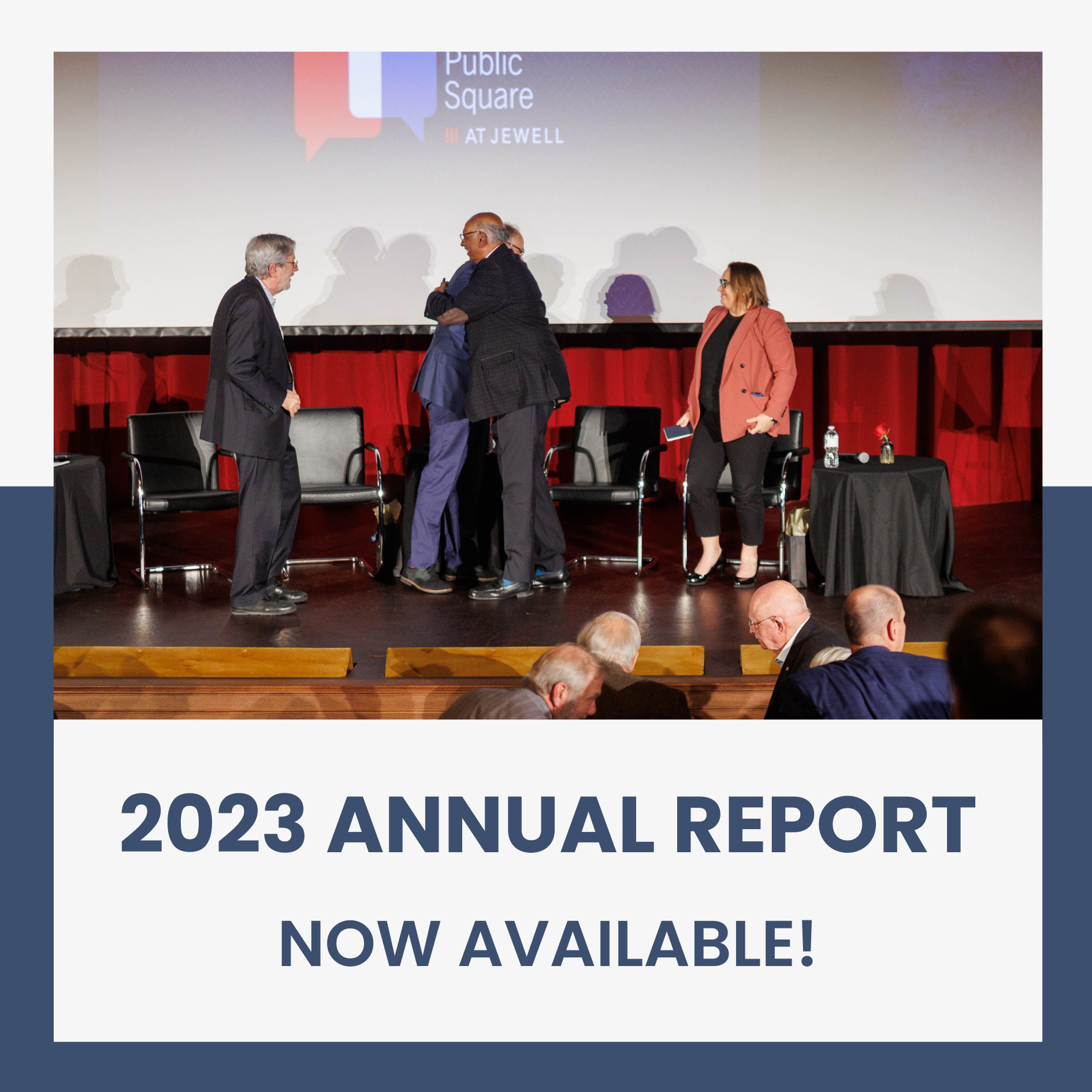 Kansas City, MO: American Public Square at Jewell (APS) has released its 2023 Annual Report. The 2023 Annual Report highlights a year when APS tackled the contentious topics of cancel culture, reparations, abortion and more. Join us on a look back at the organization’s efforts to increase civility, facts and perspective in our nation by bringing the community together in civil dialogue.
Kansas City, MO: American Public Square at Jewell (APS) has released its 2023 Annual Report. The 2023 Annual Report highlights a year when APS tackled the contentious topics of cancel culture, reparations, abortion and more. Join us on a look back at the organization’s efforts to increase civility, facts and perspective in our nation by bringing the community together in civil dialogue.
While 2023 continued to exhibit signs of deep political polarization, socioeconomic disparities, and societal unrest, we also saw communities across the nation exhibit creativity, resilience, and a sense of community that helped drive progress in the face of seemingly endless challenges.
- In the Spring, APS Student Ambassadors impressively took on the topic of abortion, a topic APS had long avoided.
- After a Kansas City commission came together to reconcile its role in slavery, segregation and racial injustice toward the Black community, APS showed up to highlight the many tough questions facing the commission.
- On a warm summer evening, a group of women convened to share experiences and support each other on their individual civic engagement journeys.
- In October, APS hosted community activists from across the nation for a weekend of collaboration, bridge-building and skill-building to help make their home communities stronger.
- To close a dynamic year, APS hosted its most successful Evening at the Square event ever, hosting the headliners David Axelrod, Michael Steel and Margaret Talev.
Additional topics covered in APS’ 2023 program season included cancel culture, gender identity, revolution in Iran and more.
APS is also pleased to share the 2023 Annual Report is digital and fully optimized for viewing on smart phones, tablets or PCs.
View the report here.
Media inquiries can be directed to Robin Smith via email at robin@americanpublicsquare.org.
Selecting our Panelists-A Message from APS CEO, Allan Katz
June 15, 2023
After every APS program, I’m fortunate to receive a variety of feedback about the panelists, the moderator, the topic and more. I appreciate it. This type of engagement from our community is important to me and my colleagues.
The choice of our panelists is often a focus of the feedback I receive and as I’ve considered everything I’ve heard recently, I’m motivated to share some thoughts with you.
If you’re familiar with APS then you know we are purposeful about choosing topics that are divisive and the source of many divergent perspectives—this approach is part of what differentiates APS. It should then be no surprise to you to hear that not everyone we seek out to participate is comfortable showing up and voicing their perspectives in front of a live audience and streaming cameras. Finding knowledgeable panelists who agree to sit on our panels and are available to do so is one of the most time consuming and challenging (sometimes arduous) tasks we have at APS. So above all, I want to express my sincere appreciation for the panelists who do show up. They make these challenging conversations possible, and I believe we are all better for their participation.
Secondly, divisive topics naturally generate emotional responses. It’s entirely possible that some audience members find themselves uncomfortable with certain commentary, panelists, or other audience members. And this is okay. It is not our role to temper strong emotions or limit perspectives—it is our job to expose diverse and divergent perspectives. Even if an audience member vehemently disagrees with a panelist’s commentary, I believe they are better for having been exposed to it. It is part of what will expand their understanding of the complexity of these issues. I can also assure you, whatever viewpoint they’re there to represent every panelist has supporters in the room. If our programs only serve to reinforce beliefs already held or do nothing to expand understanding of a different perspective (even if one hates it), then we have fallen short in our mission.
Finally, just because we are purposeful about creating space for divergent perspectives, doesn’t mean we don’t draw lines on what is acceptable. For the most part, we believe exposure to diverse and divergent perspectives is a constructive learning tool—a way to understand the nuance and complexities of the issues we face as a nation. But we would never intentionally seek out a panelist who we believe brings a real threat of inciting violence, spouting hatred, or exclusively relying on hyperbole or categorical falsehoods. And to safeguard our conversations from these things, we’ve built mechanisms to manage our programs in our Civility Toolkit—fact checks, civility bells, experienced moderators and more.
As a community, your presence at our programs and the reactions to the discussions remain deeply valuable to me and the staff at APS. As you continue to engage in our programming, I ask you to do so with the perspective I’ve offered here. Listen with intent. Reflect on your first impressions. Learn something from everyone who shows up to the conversation. Sit in your discomfort. And use all of that to expand your own understanding and beliefs in the topics at hand.
After all, that is what APS is all about.
Ambassador Allan Katz (ret.)

A note on cancel culture, from Amb. Allan Katz (ret.), CEO-American Public Square
On Tuesday, March 21, APS is partnering with KCPBS and The National WWI Museum and Memorial to present a program that will address our society’s increasing unwillingness to tolerate divergent viewpoints. The “Canceled, Censored, Banned” program will feature a panel of experts entrenched in the issues of book banning, free speech, freedom of information, and more. APS initiated this program because we can see the divide between two sides who seem to sincerely believe they are making a stronger, more civil society by imposing their beliefs about what should be seen, said, heard or read.
The March program panel includes:
- Jay Ashcroft, a Secretary of State who is advocating for policies he believes will protect minors from non-age-appropriate materials.
- Sally Bradshaw, a longtime political advisor turned bookstore owner focused on providing wide ranging content and programming that improves civil discourse in Florida.
- Michael Ryan, an author and career journalist who has lived the experience of being a lone conservative voice in newsrooms.
- Emerson Sykes, an ACLU attorney focused on free speech protections through the ACLU’s Speech, Privacy and Technology project.
This panel is undoubtedly qualified to examine this growing phenomenon in America.
As I consider the cancel culture topic, it’s easy to feel that it’s unique to contemporary society, but this is not a new issue. I am reading Adam Hochschild’s recent book “American Midnight” which chronicles what happened in America when we entered World War I. While I was familiar with the horror of slavery, Jim Crow, Japanese American internment, and the McCarthy era, I was unaware that Americans were jailed, beaten, and even killed for expressing dissent after the U.S. entered the first world war. Books with German titles were burned, and public gatherings were frequently and violently disrupted with no intervention by legal authorities. Perhaps the most surprising is that this happened with the approval of President Woodrow Wilson, largely viewed as a progressive era icon.
We have a history of intolerance, particularly centered on the belief that the books or speeches of those with whom we disagree are dangerous. We have a history of using the coercive power of the state to “strong-arm” compliance with given perspectives. And today, I believe we are seeing similar risks with the growing propensity to want to silence, or cancel, perspectives that conflict with our own.
APS’ mission centers on providing platforms for those who feel strongly about one perspective to engage with those who have a different perspective–not as enemies in violent or contentious political conflict, but as fellow community members who need to be challenged by different perspectives so that the community can determine a path forward together. Our work at APS is not to advocate, but we welcome advocates in our midst. We fervently believe all of us will be better for understanding the basis of opposing beliefs, even if we are not moved from our original position.
If this is the way we more consistently address public issues, we believe our community and our nation will be a better, more dynamic, and successful society. We have no doubt you have your own opinions on cancel culture, book banning, political and social censorship—so join us on March 21. Come challenge your own perspective and engage in a meaningful conversation alongside those with whom you may disagree. It is sure to be a lively conversation about an important issue in American culture, past and present.
See you there.
Ambassador Allan Katz (ret.)
A note on our student-produced program tackling Abortion, from Amb. Allan Katz (ret.), CEO-American Public Square
On Tuesday, April 25 American Public Square will host our first program on the topic of abortion and how it is dividing our country.
This program has been produced by the high school students participating in our Civics Education Initiative, a student-led program. Candidly, this is a topic we adults have studiously avoided in the nine years we have been doing programs at American Public Square. However, we feel strongly about giving our students a voice in these decisions and it was they who decided this was the topic that needed to be discussed. And so, we are going for it.
I had some time to sit and chat with a group of students during their final workday last week and several of them cited that their interest in this topic was heavily driven by the Dobbs decision which overruled the longstanding Roe v. Wade precedent. All of us agreed this decision highlighted, and in some cases reignited longstanding divisions. This should be taken seriously by every American, no matter your political affiliation—even if we hate the divisiveness of this topic, we can’t ignore it.
We hope the students’ program will be a model to encourage more of us to engage in civil dialogue about abortion and other polarizing topics so that we may work together to build a less contemptuous, safer, and more productive society. There is no question that our panelists hold wildly different views on this topic, as does our broader APS community. This program is a chance for us to come together, look beyond our closely held positions for the evening, listen to facts, hear different perspectives, seek to understand the “whys” behind those perspectives and begin to navigate a path forward—for the students in the room and all those to come.
Will you join me in supporting these local students by attending their program Tuesday evening? The in-person event takes place at the Plaza Branch of the Kansas City Public Library, beginning at 5:30pm; there is a virtual viewing option as well. You can register here.
Ambassador Allan Katz (ret.)

